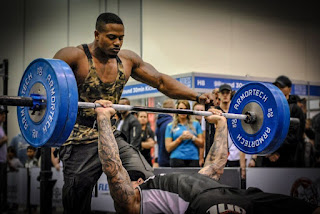As part of my ongoing series of posts on the topic of Powerlifting, here are 6 Tips for Beginner Powerlifters.
But first, if you're unfamiliar with Powerlifting please read:
Powerlifting Tip #1: Bench Press - Squeeze your Scapula/Shoulder Blades
By squeezing your scapula during bench pressing it will help will keep your shoulders on the bench (where they should be) and help to reduce the range of motion. You don't need to squeeze them super hard, just enough to help keep your shoulders on the bench. Keep your shoulders tight throughout the movement and then lock out the elbows at the top of the exercise. This will ensure better form and improved stability. Squeezing the scapula a bit will also engage more of your triceps and help with your overall lift.
Do not squeeze your scapula as hard as possible. That is completely unnecessary and counterproductive.
You want to keep your chest up and facing forward at the bottom of the movement and throughout the entire lift. By doing this you will prevent your torso from folding when you reach the concentric part of the squat (at the bottom) and reduce the potential for injury and improve your stability, which is especially vital during a heavy squat.
Powerlifting Tip #3: Deadlift - Do Not Bend Your Arms, Think Hooks
Never bend your arms while performing a deadlift. Instead keep your elbows locked and arms straight throughout the movement and think of your arms like fishhooks that don't bend or move. If you try and pull the bar up with your biceps you’ll likely tear a tendon, which will keep you out of the gym for a long time. Just think of your arms as hooks, you are simply using them to hold on to the weight and nothing more. The main muscles that will be used during a deadlift will be your quads, glutes, hamstrings and spinal erectors.
Powerlifting Tip #4: Split Up Your Training
You should practice split system training, which means you have to focus on a specific body area and training until you get fatigued. This allows for intensive training, when compared to a full body workout, with ample recovery time before training that section again.
Unlike some weightlifters who might alternate upper body and lower body, you want to be more specific than that. Thus a typical week for a powerlifter could end up looking like this:
- Monday: Back
- Tuesday: Chest
- Wednesday: Shoulders / Traps
- Thursday: Biceps / Triceps
- Friday: Legs
- Saturday and Sunday are rest days.
So for example I am currently doing a simple Weightlifting Routine wherein Mondays and Thursdays are Leg Days and Tuesdays and Fridays are Upper Body. Wednesday/Saturday/Sunday are my rest days. If I wanted to start doing Powerlifting then I would need to make significant changes to my exercise routine.
Powerlifting Tip #5: Don't Over Train
3 to 5 days a week is a good rule of thumb for the maximum number of days per week a Powerlifter should be training. You will have to discover the hard way whether you should be exercising 3, 4 or 5 days per week. But you will know you are Over Training if get any of the following side effects:
- Increased Muscle Soreness due to not enough rest/recovery time.
- Poor sleep.
- Recurring Sports Injuries.
Powerlifters generally do not train as much as bodybuilders (who are often exercise addicts) and because they're lifting a lot more they need to pace themselves more and allow for ample rest periods. Part of this is because powerlifting causes strain on their CNS (Central Nervous System) and that needs more time to recover.
Powerlifting Tip #6: Ample Rest Period
This is obviously connected to the previous point above. If you give your body a large enough rest period it will help you to recover more efficiently from an intense session. Allowing for ample muscle recovery time (and CNS recovery) means you will see better results the next time you train. This will result in increased muscle and strength gains.
This also means that you should be wary about certain activities. Eg. If you had an intense session on Friday you should avoid helping a friend to move a piano on Saturday. If you get a sports injury while moving that piano you could set back your training significantly.
Instead on your days of rest you should focus on lighter activities and avoid anything that could put strain on your recovery.






















No comments:
Post a Comment
Comments containing links will be marked as spam and not approved. We moderate EVERY comment. Unmoderated comments are hidden until approved.
If you want better quality advertising, consider product reviews instead.